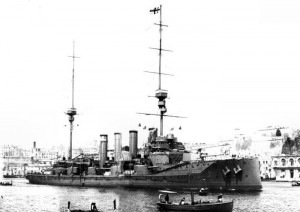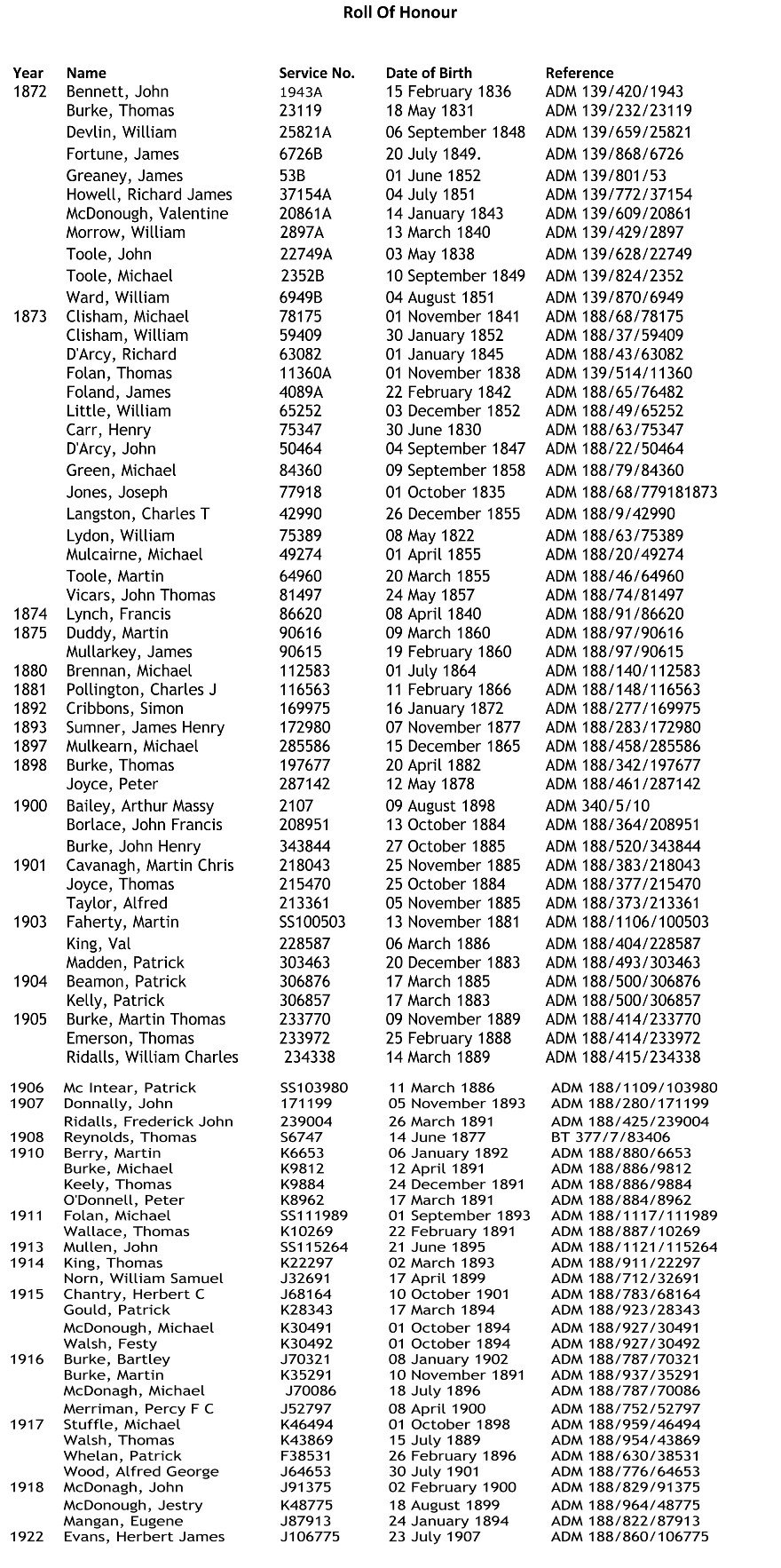Clifden Rules the Waves: The story of Clifden men in the greatest Navy on earth (1872-1922)
By Steven Dolan
The expansion of the British Empire in the nineteenth century owed as much to the dominance of the Royal Navy, as to perhaps any other military or indeed political factor. The Navy held an overwhelming advantage over all other national or combined fleets and ruthlessly dispatched any power that threatened that dominance. The Navy also protected the world’s seaways from pirates and they truly did ‘rule the waves’!

The role of Irish Seamen in the great history of the Royal Navy has heretofore been an untold story. Moreover, the special contribution of Clifden to that history from the likes of Patrick Guane who enlisted in the middle of the century; through to Seamus Ó Muiris, later father of the Irish Navy (refer to Journal of the Clifden and Connemara Heritage Group, Volume 1) is only now being recognised. Their tours took them across the globe, with service for these men being physically and mentally tough.
While we do not traditionally have a culture of honouring those who fought in ‘British’ ranks, as we mark the centenary of World War I, it is perhaps time to revisit our military contribution to the Empire with a fresh perspective. In doing so we can honour the memory of Martin Berry from Ballyconree, Clifden, ‘leading stoker’ on H.M.S. Defence, who perished in 1916; and (able seaman) Charles James Pollington, who perished on the 30th May 1918 on H.M.S. Indus.
The story of Clifden’s contribution to the greatest fleets ever amassed, of course, predates the Great War. To that end the following is a breakdown of 79 Navy men from Clifden who served in the Royal Navy in the half-century straddling the nineteenth and twentieth century (i.e. from 1872 to independence). Note that the year given below is merely a year of service, albeit in many cases is the actual year of discharge.
The roll of honour is as follows:
If one analyses the age at enlisting, it was low at 18 years, though this was not uncommon given the era. Of the early sailors mentioned, John Bennett and Thomas Burke were both aged 23 but this was very much the exception as William Devlin was just 14 years and 7 months. The breakdown of the next fourteen men was: Fortune aged 19, Greaney not yet 14 years 8 months, Howell aged 14 years 10 months , McDonough aged 19, Morrow 18, J Toole 24, M Toole 17, Ward 16, M Clisham 20, W Clisham 16, D’Arcy 18, Folan 22, Foland 17, Jones 24, and Little aged just 14 years 7 months.
All the above individual records are available for viewing in person at the U.K. National Archives in Kew, with many also available to order and view at the main NAUK website (www.nationalarchives.gov.uk/), and other pay genealogy web-sites. In addition, thanks to the increasing interest in genealogy, records of the vessels they served on are becoming freely available and so can also be traced. Great pride can be taken from the conduct and bravery of these Clifden men, with many earning medals for their conduct. Without the sacrifice of these men and their comrades, the modern world would be a very different place!
“Bíonn súil le muir ach ní bhíonn súil le tír”
Additional References: Additional records exist for some of the men, namely Michael Clisham (ADM 139/578/17703), William Clisham (ADM 139/844/4359), Richard D’Arcy (ADM 139/464/6344), Thomas Folan (ADM 188/23/50840), James Foland (ADM 139/441/4089), William Little (ADM 139/822/2178), Francis Lynch (ADM 157/1334/137), Thomas King (ADM 188/1119/113280). Finally, the pioneering Patrick Guane of ‘Ballendron, Clifton, Galway’ enlisted aged 25 at Chatham in 1859, before being invalided six years later. Guane’s records are available under references ADM 157/93/468 and ADM 157/1307/192.





Wonderful list of names which will, no doubt, be of great benefit to those tracing their family roots in Connemara.
I have been searching for my Great Grandfather Rodger Lydon who was born in Galway on the 6th January 1841. On the 10th October 1858 he enlisted in the Royal Navy as a Boy Second Class. His No was 98440 and he was on HMS Hawke as an AB seaman. He then re-enlisted in 1869 and was a Boatman in the Water Guard posted to Ross Station on HMS Valiant. He served in Barna, Raghley, Ross and Tribane between 1869 -1879 when he is pensioned off. He married Bridget Reilly at some point. Then in 1881 he is in Liverpool but there is no record of the next 10 years until he re-enlists at HMS Pembroke as a AB pensioner. He stays in the Navy until 1908 when his Navy record ends but does not say what happened to him.
Although, I have his service history I know nothing about where he was born or his family background but I believe he may have had connections with Clifden. I would be pleased if anyone has any information about him or indeed Bridget.
Found out that my great grandfather Richard D’Arcy was discharged in San Francisco from the RN in 1873 served in the Pacific Squadron. He did not return to Ireland and died in January 1896 and is buried in Colma, California. I have lived in California since 1975 although I was born in England so I was surprised that an ancestor got here way before I did.